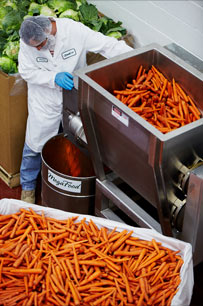MegaFood’s “Road Less Traveled”—it makes all the difference
By Arianne Pfoutz
Published: September 1, 2013
Category: Non-GMO company profiles

MegaFood makes supplements from whole foods such as carrots
To access all the articles in this month's issue of The Organic & Non-GMO Report, SUBSCRIBE NOW.
Unique process creates organic, non-GMO, nutrient-rich supplements from farm fresh foods
It’s been 40 years since MegaFood was founded on the premise that the best dietary supplements should come directly from fresh, whole foods. Today, the vertically integrated Derry, New Hampshire company remains the only one to make its own vitamins from scratch, using primarily fresh local and regional food. From drying vegetables and fruits to shipping the formulas, MegaFood oversees every step, ensuring its products are “Fresh From Farm To Tablet.”
With recent Non-GMO Project verification and a concurrent growth, the original vision and unique technologies are paying off. MegaFood has also launched a partnership with Dr. Andrew Weil to jointly develop wellness programs accessible to communities through science-based education modules offered at natural foods retailers.
Slo-Food Process™ ensures potent, accessible nutrients
MegaFood is the oldest whole food supplement company in the US, and one of the fastest growing. The US and Canada provide fresh ingredients, with much coming from nearby family farms: antioxidant-rich cranberries from Decas on Cape Cod, for example, and blueberries from Maine. Through company offers over 60 whole food supplements for men, women, and children—containing “Authentic Nourishment.”
When Carl Jackson bought the company in the 1980s, he introduced unique low-temperature food drying equipment that kept nutrients and compounds intact. Supported by researchers at the University of New Hampshire, he perfected a Slo-Food Process™ technology that captures phytonutrients and trace minerals not found in isolated supplements. Cold-milling and enzymatic pre-digestion processes help to enhance digestibility, bioavailability, and nutrient retention.
“Carl knew it was expensive but insisted on doing it the right way,” said CEO Robert Craven. “He took it to the next level with this manufacturing technology.”
I took the invitation to come see for myself at the company’s recent 40th Birthday Bash, which included a tour of the 40,000 square-foot manufacturing facility. I got to see the nutrients—pieces of brightly colored dried foods—which are then ground into powder and mixed together in a blender to formula specifications, before being formed into tablets, weighed, measured, glass-bottled, and labeled.
In a 25,000 square-foot facility down the road, the FoodState Nutrients™ are created, starting as fresh or fresh frozen foods and transformed into 28 unique formulas from Vitamin A to Zinc. The building contains a state-of-the-art analytic lab, where five chemists test for organic, vegan, non-GMO, and gluten-free ingredients, and ensure the potency and purity of each formula. The lab is a certified ISO-9001 facility, and has been certified as compliant with the necessary segregation and traceability measures required for Non-GMO Project Verification.
Supporting non-GMO certification: The Non-GMO Working Group
MegaFood’s product line has been non-GMO for over five years, and they recently obtained Non-GMO Project Verification for five products: Blood Builder®, Wild Blueberry, Magnesium, Calcium, and Calcium, Magnesium, & Potassium.
“Our consumers are demanding the Non-GMO Project seal,” said Bethany Davis, Regulatory Manager.
But supplement manufacturers are facing real hurdles with the rigorous certification standards.
“The Non-GMO Project Verified seal is one of fastest growing seals out there, and retailers have defaulted to it,” Craven said. “But the branding of the seal is outpacing our brand, creating an immediate issue for us—how do we get our products through? The level of documentation required for supplements is immense—in a product line with over 400 ingredients, it becomes overwhelming. It’s a lot easier to get a bag of corn chips verified than a supplement.”
In March 2013, at Expo West, he gathered together raw material suppliers, product manufacturers (including competitors New Chapter and Garden of Life), distributors, members of the United Natural Products Alliance (UNPA) and Natural Products Association, and others—and formed the Non-GMO Working Group. The group has submitted comments to the Non-GMO Project regarding how to help reduce the certification bottleneck for supplement manufacturers, and make it more realistic for supplement manufacturers to participate.
“We’re trying to reach a tipping point on this—banding together to increase our buying power and to encourage raw material suppliers to get their products non-GMO certified,” Davis said.
Non-GMO versus Organic
Craven is also concerned that the organic seal is being overshadowed by the non-GMO one. “Organic certification is broader than non-GMO: it includes non-GMO, pesticide-free, herbicide-free, sustainable production. Non-GMO is just one piece. While not wanting to undermine the importance of non-GMO, I want people to understand the difference.”
Spreading the word with Dr. Weil
Craven cites MegaFood’s biggest challenges as “keeping up with demand, and getting the story out.” One thing he’s done to solve the latter is to join forces with Dr. Weil to spread the word of a healthy lifestyle supported by nutritious whole food and supplements.
“Natural retailers are struggling because organic and natural products are going mass—Target, Walmart and others are now offering them. To help them compete, we support them with content—Dr. Weil’s “credible education”—so they can build community and a customer base. It’s about lifestyle, not silver bullets—and our MegaFood products support that lifestyle. That’s the big vision. If we do well at connecting people with their natural food stores and their communities, it’s a win-win-win.”
© Copyright The Organic & Non-GMO Report, September 2013




